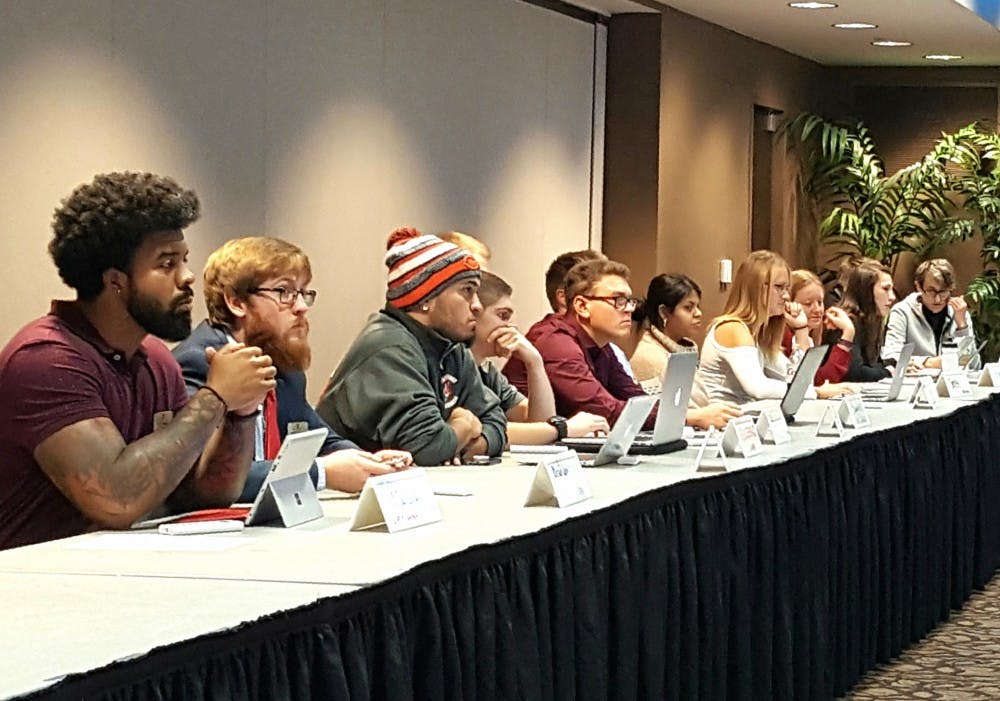For some students, election season brings excitement and the chance to make a difference. For others, navigating elections can be confusing.
Student Government Association (SGA) elections are underway, and campus participation is a crucial aspect in a successful season.
For those who may be confused by the election process, here’s a rundown of what to expect in the next few weeks:
Who is being elected?
Students can cast votes for:
- One executive Slate
- 7 At-Large Seats
- 10 Off-Campus Seats
- 10 Collegiate Seats
- 5 university senate seats
What is the executive slate?
Similar to voting for presidential and vice presidential candidates, members of an executive slate run on the same ticket. The positions in each slate include:
- President
- Vice president
- Secretary
- Treasurer
The slate must be nominated at the nomination convention to run. To be nominated, the slate must submit a $200 bond payment and at least 400 signatures on a petition form by Feb. 9. Additionally, slates need to have the elections packed filled out by Feb. 9.
Each member of the slate is required to have:
- At least a 2.8 cumulative grade point average
- Full-time status at the time of nomination
- Three semesters of classes completed
How do students vote?
Students can vote through a link sent in a campus-wide email sent by the Office of Student Life.
Voting opens Feb. 26 at 8 a.m.
Students can cast votes for:
- One Executive Slate
- 7 At-Large Seats
- 10 Off-Campus Seats
- 10 Collegiate Seats
- 5 university senate seats
Who runs elections?
The Elections Board is a group of students approved by the SGA senate responsible for monitoring campaigning.
It includes seven members, each with a specific position:
- Elections Board chair
- Sheriff
- Secretary
- Treasurer
- Debate coordinator
- Press secretary
- Voting member
How do students run for office?
Students can run for a variety of offices in elections including: executive slate, at-large seats, off-campus seats, collegiate seats and university senate seats.
Off-campus, at-large and collegiate candidates need 50 signatures before the nomination convention.
To run for any office, a student must be full time and must be in good academic standing.
What is a nomination convention?
On Feb. 12 in the Art and Journalism Building room 175, students who have turned in their packets can be nominated by someone outside their slate.
Once nominated, the Elections Board approves the nomination. As long as all the requirements are fulfilled, the candidates are officially in the race.
The slate may begin campaigning as soon as the convention ends.
What are slates allowed to do in a campaign?
Candidates can both fundraise and promote their platforms as long as it falls within the election code. If they violate the code, candidates will be reviewed by the Elections Board and fined.
Fines can be issued for anything against the election code and is up to the discretion of the elections board sheriff.
Campaigns can cost up to, but no more than $2,000. A separate $200 bond is required to begin campaigning.
If slates are fined, the payment comes out of the bond.
What happens at the debates?
The Presidential and Vice Presidential debate, All Slate debate and Presidential Town Hall debate are planned by the debate coordinator each year. The Elections Board chooses a student not involved in SGA to be the moderator.
Topics in the debate can include anything from platform points to broad overviews of their hopes for student government. Candidates explain their slate’s platform points and tell students why they think they should be elected.
When will winners be announced?
The winners will be announced Feb. 27 after 5 p.m. at the L.A. Pittenger Student Center Office of Student Life.
A winner is determined by a majority of votes cast. If no slate receives a majority vote, a runoff election will be held.
Contact Liz Rieth with comments at ejrieth@bsu.edu or on Twitter at @liz_rieth. Contact Sara Barker with comments at slbarker3@bsu.edu or on Twitter at @sarabarker326.





